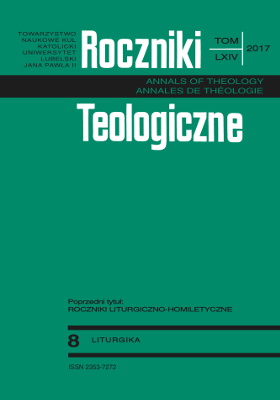Celebracja nałożenia kar osobom duchownym i ich zniesienia według potrydenckiego Pontificale Romanum
Celebration of the Imposition and Removal of a Penalty according the Tridentine Pontificale Romanum
Author(s): Waldemar PałęckiSubject(s): Christian Theology and Religion, Theology and Religion, Pastoral Theology
Published by: Towarzystwo Naukowe KUL & Katolicki Uniwersytet Lubelski Jana Pawła II
Keywords: suspension; degradation; deposition; the clergy; clerics
Summary/Abstract: The Roman Pontifical, reformed after the Council of Trent, contained the rite of suspension, deposition or degradation with regard to clerical persons, which had also the character of a liturgical celebration. The rite of suspension and deposition appeared already in Durand’s Pontifical, while the rite of degradation, specified by Pope Boniface VIII (1294–1303), was included only in the addendum to Durand’s Pontifical, Toulouse Codex of the 14th century (Cod. Lat. 118). This rite was also included in Pontificalis liber of 1485, authored by Agostino Patrizi Piccolomini (d. 1495/1496). Among these rites we see also the celebration of degradation of a psalmist (Degradatio psalmistatus), which is not featured in the post-Tridentine pontifical. These rites were omitted in the current edition of the Roman Pontifical, published in 1961–1962.In a situation of a serious offence there was a possibility of bearing serious consequences in order to redress a wrong done to the community. The award of some penalties required a collegial action. In the case of suspension, the penalty could be imposed by a bishop himself. He could also have the support of his chapter. Also, a collegial action was required of bishops when awarding deposition, followed by degradation: three bishops for a subdeacon, six for a presbyter, twelve for a bishop and metropolitan. During a degradation particular vestments and insignia were taken away, emphasising their significance and the cleric’s non-performance of his ministry bestowed during the ordination. Although the penalties of suspension, deposition and degradation were severe remedies in the Church, no possibility was excluded to grant dispensation privately or restitution in the case of an unjust and undeserved ruling. This demonstrates a great sense of charity and grace as well as an opportunity to redress one’s wrondoing.
Journal: Roczniki Teologiczne
- Issue Year: 64/2017
- Issue No: 8
- Page Range: 111-128
- Page Count: 18
- Language: Polish

